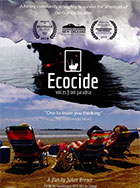
Ecocide: Voices from Paradise 2014
Distributed by Collective Eye Films, 2305 SE Yamhill Street, Suite 101, Portland OR 97214; 503-232-5345
Produced by Juliet Brown, for the Bertha Foundation & NFTS (National Film & Television School)
Directed by Juliet Brown
DVD , color, 58 min.
Middle School - General Adult
Ecology, Fisheries
Date Entered: 08/16/2017
Reviewed by Cliff Glaviano, formerly with Bowling Green State University Libraries, Bowling Green, OHThe BP Deepwater Horizon explosion and oil spill that began on April 20, 2010 changed the lives and livelihoods of the citizens of Grand Isle, LA irreversibly. Grand Isle is about 45 miles south of New Orleans and was the first site that experienced oil coming ashore from the spill. As part of the cleanup, BP hired a fleet of aircraft to spray Corexit oil dispersant over the slick. The dispersant sinks floating oil to the bottom, putting most of the oil out of view, but covering underwater vegetation. Residents of Grand Isle were exposed to Corexit and became ill from the spray, possibly acquiring permanent respiratory problems and even cancer although they were told the air was safe to breathe. By 2012, beaches were declared safe and eating local seafood was allowed.
Though everything was advertised as being safe, many residents have boycotted local seafood and beaches following spill cleanup and spraying. A study from Georgia Tech found Corexit treatment made spilled oil up to 50 times more toxic to humans and wildlife than oil that washed up on the shore. The Grand Isle community that depended on fishing and tourism noticed tumors on dolphins and shrimp, and dead fish and chemical foam washing ashore. As of the filming, BP cleanup of the foam and sifting oil from beach sand was continuing. Many residents have rebuilt homes damaged in hurricanes, but many are reluctant to continue living on Grand Isle since air quality and water quality are no longer being tested. Their future seems very uncertain.
None of the residents interviewed in the film seem to have been adequately compensated for their loss of property or livelihood from the spill. In fact, the owner of the once 3rd largest shrimping operation in Louisiana claims that there are no “spillionaires” on Grand Isle. Ecocide is highly recommended. As regulations on energy industries are being eroded, just what can citizens do when they are told they can resume their lives since everything is “safe,” even as they observe that things are really not safe? A bonus feature on a proposal to write the crime of ecocide into international law is well worth a look.